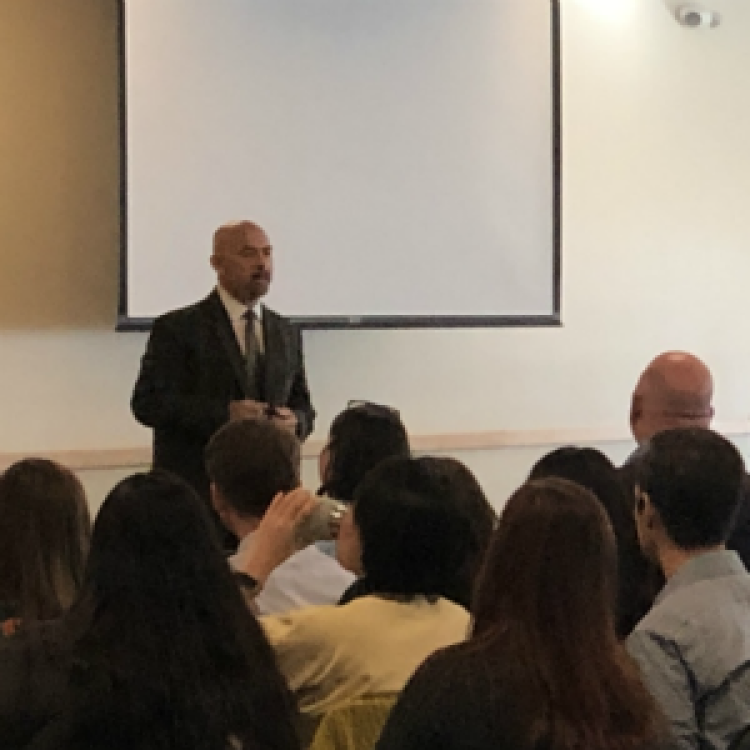CU Boulder creates pathways for Colorado transfer students
Transfer Summit unites Colorado
Leaders from the Colorado Community College System office, representatives from many of the state’s 2- and 4-year institutions, and the Department of Higher Education gathered on March 15 to collaborate on strategies for achieving a seamless and supportive transfer experience for students.

CCCS Chancellor Joe Garcia at Summit
The day-long summit, cohosted by the University of Colorado Boulder and the Colorado Community College System, brought higher education peers together at Front Range Community College’s Westminster campus to discuss updates and explore transfer challenges still needing to be addressed in Colorado.
This year’s summit delivered a few important areas of focus for Colorado in the coming years. According to Janet Yowell, CAPS Project Director at CU Boulder and organizer of the summit, most attendees agreed that attention should be paid to how two-year and four-year college curriculum lines up to ensure that students are being prepared for the greatest success.
Participants also recognized a need for improved data collection and reporting on student retention and success. “Students considering a transfer want to know how other transfer students are faring at a college,” said Yowell, “and currently, that information is not readily available across the state, or nationally for that matter.”
The “2- to 4-Year Transfer Summit,” now in its third year, originated from the CAPS (Creating Academic Pathways in STEM: A Model Ecosystem for Supporting 2-Year Transfer) initiative led by CU Boulder’s College of Engineering and Applied Science and CU’s Center for STEM Learning, with funding from the National Science Foundation. The project intent was to create clear and seamless academic pathways for transfer students pursuing STEM bachelor’s degrees and connect stakeholders across the state who are engaged in the transfer process.
Since the first summit, participation has grown considerably. This year, all but one of the 13 colleges under Colorado’s community college system and another nine of the state’s 12 public universities registered for the event. Despite a major blizzard earlier in the week that impacted travel from more distant parts of the state, attendance was high. Joe Garcia, current CCCS chancellor and former Colorado lieutenant governor and head of CDHE and the Western Interstate Commission for Higher Education—and also a University of Colorado alumnus—gave the keynote address.
CU Boulder lights pathways
The interest and excitement generated at the summit signals an increased focus and commitment across the state to improving the transfer student experience. CU Boulder has been a leader in many ways.
Last year, CU Boulder Provost Russ Moore established an Advisory Committee on Transfer Success to undertake a comprehensive review of the undergraduate transfer experience on the CU Boulder campus, which gave the issue more visibility than ever before.
When Bobby Braun joined the College of Engineering and Applied Science as dean in 2017, he expressed a commitment to creating well-lit pathways for students in the state wishing to earn a CU Boulder Engineering degree. The rubber literally hit the road when he launched an annual Engineering State Tour to personally connect with students and build relationships with community colleges across the state.
“Growing access to a CU Engineering degree is a central part of our public education mission,” said Braun. “There are students interested in engineering all across our state who could succeed here. We’re streamlining our transfer processes to make it easier for them.”
The college, which has 589 total transfer students enrolled for the spring 2019 semester, created an enhanced transfer student website and a series of transfer pathway guides for partner Colorado community colleges as well as providing pre-transfer academic advising to streamline the transfer process. These resources instruct students step-by-step in how to transfer from Colorado’s community colleges to a CU Engineering major of their choice. The guides have since become a model for similar references in the College of Arts and Sciences, under the CAPS initiative.
The college also created “2+2 pathways” for several engineering degrees. These integrated plans provide students with the opportunity to affordably complete their first two years at a community college and then transfer to CU Boulder to complete their bachelor’s degree, all within four years.
This intensive focus on securing grants and new initiatives has led to a nearly 80% increase in the number of students transferring to CU Engineering from Colorado’s community colleges since the 2016-17 academic year.
Parnterships create opportunity

Colorado Mesa University Engineering
These pathways augment two partnerships that CU Engineering has formed with colleges in western Colorado. The Engineering Partnership Programs between CU Engineering and Colorado Mesa University allows students to earn a CU Engineering degree in mechanical, civil, or electrical and computer engineering, while the newly minted partnership with Western Colorado University provides a path to CU Engineering degrees in computer science or mechanical engineering — all while students are living and learning in other parts of the state.
Growing partnerships and creating new transfer pathways are part of Braun’s strategy to expand access to engineering education across Colorado. With the largest pipeline of students who enter the engineering workforce in Colorado, CU Engineering understands the critical importance of ensuring the state’s transfer students have a clear and direct path to a degree.
Across the state, institutions involved in the transfer process are united around creating an integrated and seamless experience for students. This year, for the first time, the Colorado Community College System co-hosted the “2- to 4-Year Transfer Summit” with CU Boulder and in collaboration with the Colorado Department of Higher Education, underscoring their investment in resolving our state’s transfer challenges. CCCS will be the lead host in the future, in collaboration with CU Boulder, ensuring continued statewide focus for this issue of critical importance to Colorado.

